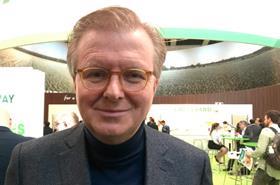
Belgian group Greenyard has said it will continue to seek out closer partnerships with its customers – in many cases using its scale and expertise to fulfill orders that come direct from retail stores and distribution hubs – to maintain its position as one of the world’s leading fresh, frozen and prepared produce suppliers.
Publishing its annual results for the year to 31 March 2018, the company reported a slight decrease in its fresh fruit and vegetable sales during the 12-month period, a result it attributed mainly to a loss of volumes.
But it also pointed out that so-called “strategic customer intimacy initiatives” – by which it meant more collaborative partnerships like its First in Fresh project undertaken with French chain Carrefour in April – are bearing fruit.
Combined fresh produce sales, which make up the bulk of Greenyard’s overall revenue, came in at €3.34bn, 2.4 per cent lower than the equivalent result for 2016/17. Total sales were €4.18bn, down by 1.7 per cent year on year.
One other notable figure in the statement was the €31.9m in non-recurring items for the year, which was far higher than the previous year’s €8.9m.
As well as spending €22m primarily on reorganising its distribution network in Germany, it also spent €8.9m on its acquisition of mushroom substrate business Mykogen and a potential bid for US produce giant Dole Food Company.
Growth, but not enough
In a statement, the group said changes in foreign exchange rates had shave 0.2 per cent off its fresh produce sales, which it noted had also declined by almost 2 per cent due to lower volumes in the German and, to a lesser extent, Belgian markets.
Continued growth in the US and France, however, as well as in the Netherlands, were not enough to offset the decline, it admitted. Likewise improvements to its product mix only had a limited impact.
On the other hand, Greenyard’s Bakker division in the Netherlands, which has itself pursued a more streamlined, direct supply model as a category management partner of leading Dutch retailer Albert Heijn, recorded “stable and consistent growth” in sales.
Elsewhere, its Long Fresh sales grew very slightly, but were also hampered by exchange rates, leaving only a small rise in earnings.
Horticulture sales were up 20.2 per cent on the year, mainly as a result of the Mykogen acquisition.
“The past year, Greenyard navigated through turbulent waters,” the group’s chief executive Hein Deprez reflected. “Results were below expectations due to pricing pressure in our main markets and a number of one-offs. We lost volumes in some of our core fresh markets, which was the main driver for the decrease in group sales and REBITDA.”
Deprez said the company remained committed to working more closely with customers to create shared strategic approaches in the fruit and vegetable market.
“By keeping our focus on creating added value in partnership with and for our growers, our retailers and our consumers, we are confident that we can make the difference in strengthening our position as a global leader in fruit and vegetables in all its forms,” he added.
Greenyard has made a number of changes to its management teams in the past year, most notably during last January’s shake-up that saw Marleen Vaesen depart as CEO and CFO Carl Peeters take on a newly created chief operating officer role.
Deprez said this had brought the company closer to its operations and customers, making it “more agile and faster” in its decision-making: “This facilitates the acceleration of the reorganisation of our footprint and organisational design, laying the foundation for the next level in the execution of our strategy.”



